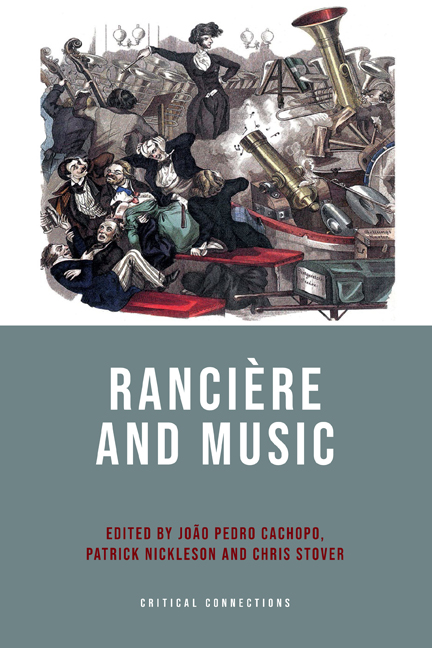Book contents
- Frontmatter
- Contents
- List of Examples
- Acknowledgements
- Notes on Contributors
- Introduction
- Part I: Music and Noise
- 1 Musique concrète and the Aesthetic Regime of Art
- 2 ‘Rip it up and start again’: Reconfigurations of the Audible under the Aesthetic Regime of the Arts
- 3 A Lesson in Low Music
- Part II: Politics of History
- 4 Wandering with Rancière: Sound and Structure under the Aesthetic Regime
- 5 Staging Music in the Aesthetic Regime of Art: Rancière, Berlioz and the Bells of Harold en Italie
- 6 Rancière on Music, Rancière’s Non-music
- 7 Coloured Opera and the Violence of Dis-identification
- Part III: Politics of Interaction
- 8 Musical Politics in the Cuban Police Order
- 9 Rancière and Improvisation: Reading Contingency in Music and Politics
- 10 Rancière’s Affective Impropriety
- Part IV: Encounters and Challenges
- 11 Rancière, Resistance and the Problem of Commemorative Art: Music Displacing Violence Displacing Music
- 12 Stain
- 13 On Shoemakers and Related Matters: Rancière and Badiou on Richard Wagner
- 14 Roll Over the Musical Boundaries: A Few Milestones for the Implementation of an Equal Method in Musicology
- Afterword
- A Distant Sound
- Works Cited
- Index
2 - ‘Rip it up and start again’: Reconfigurations of the Audible under the Aesthetic Regime of the Arts
Published online by Cambridge University Press: 03 October 2020
- Frontmatter
- Contents
- List of Examples
- Acknowledgements
- Notes on Contributors
- Introduction
- Part I: Music and Noise
- 1 Musique concrète and the Aesthetic Regime of Art
- 2 ‘Rip it up and start again’: Reconfigurations of the Audible under the Aesthetic Regime of the Arts
- 3 A Lesson in Low Music
- Part II: Politics of History
- 4 Wandering with Rancière: Sound and Structure under the Aesthetic Regime
- 5 Staging Music in the Aesthetic Regime of Art: Rancière, Berlioz and the Bells of Harold en Italie
- 6 Rancière on Music, Rancière’s Non-music
- 7 Coloured Opera and the Violence of Dis-identification
- Part III: Politics of Interaction
- 8 Musical Politics in the Cuban Police Order
- 9 Rancière and Improvisation: Reading Contingency in Music and Politics
- 10 Rancière’s Affective Impropriety
- Part IV: Encounters and Challenges
- 11 Rancière, Resistance and the Problem of Commemorative Art: Music Displacing Violence Displacing Music
- 12 Stain
- 13 On Shoemakers and Related Matters: Rancière and Badiou on Richard Wagner
- 14 Roll Over the Musical Boundaries: A Few Milestones for the Implementation of an Equal Method in Musicology
- Afterword
- A Distant Sound
- Works Cited
- Index
Summary
In May 2016 Iggy Pop accompanied director Jim Jarmusch to the Cannes Film Festival. The two men had been invited for the premiere of Gimme Danger, a passionate documentary on the chaotic history of the singer and the protopunk group that he helped cofound at the end of the 1960s, alongside brothers Ron and Scott Asheton and Dave Alexander: the Stooges. Unsurprisingly, during the press conference, the rocker was asked to give his opinion on the current state of the music industry. Sullen, he responded: ‘It's different, now. You can push a button and get rich quick. And I think also that there's an argument to be made about the human races [sic] approach[ing] to the point where the technology gets to the point [sic] where it's going to grip everybody by the shoulders and shake us and then throw us down and get rid of us.’ Then, parodying a techno rhythm and beating on the table: ‘WHOA! You know? Why don't I just die now?’ This critique, fearing that a cold and dehumanising technology would come to replace the warm and authentic expression of an artist, is hardly new. At the turn of the twentieth century, the American composer and conductor John Philip Sousa could not find words strong enough to condemn the ‘infernal machines’ of phonography: ‘The time is coming when no one will be ready to submit himself to the ennobling discipline of learning music … Everyone will have their ready made or ready pirated music in their cupboards.’ More fundamentally, perhaps, these somewhat alarmist discourses remind one of a certain reactionary press which, well before the age of mechanical reproduction, castigated the ‘almost scientific precision’ of the realist novel:
Were one to forge in Birmingham or Manchester narrating and analyzing machines made of good English steel, functioning all by themselves through unknown dynamic processes, they would function exactly like M. Flaubert. One would feel in these machines just as much life, as much soul, as much human entrails as in the man of marble who wrote Madame Bovary with a pen of stone, like the knife of savages.
- Type
- Chapter
- Information
- Ranciere and Music , pp. 47 - 70Publisher: Edinburgh University PressPrint publication year: 2020



